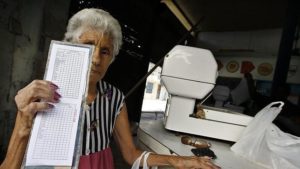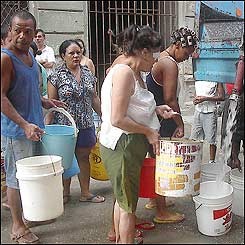 MORE THAN TWO THOUSAND SPANISH CITIZENS, DECIDE TO MOVE TO CUBA.
MORE THAN TWO THOUSAND SPANISH CITIZENS, DECIDE TO MOVE TO CUBA.
Sometimes things happen that make you wonder if the world has not gone crazy. When Cubans queue and spend what they do not have to get Spanish citizenship and be able to leave the island for any part, some Spanish pensioners decide to settle on the island to live a life similar to that of Cubans in exchange for enjoying free medical attention and receive a supply booklet with a few foods per month.
“I have a supply booklet (for the distribution of food products) and I am treated for free in the hospital. In most of the things I am as Cuban as the most, I even make my queues to buy food or I complain about how bad the transport is “, says with a laugh José Ignacio Pérez, a Spaniard who lives in Cuba since the year 2007
He does not live in a cache neighborhood in the west of Havana, but in the community of La Vigía, in Santa Clara, where there are many Soviet-style buildings.
To settle down on the island, they had three cards that they decided to play: Carmen had Cuban nationality (she was born on the island and emigrated when she was ten years old), more than 1,500 euros of pension between the two, and militated in organizations sympathetic to the Government of Cuba in Spain. Even so, the Island authorities took a long time to accede to the request and the two pensioners had to spend enough money to achieve it. “The Cuban law is very strict regarding the granting of permanent residence to foreigners,” explains Ignacio. “Although Carmen had never renounced her Cuban citizenship and for years she had relations with the family she had here, it took us a lot of work to get her approved. After all, everything went smoothly, because as we were husbands my condition was much easier to solve “.
Although many Cubans, who wish to leave the country on a fixed course to any part, find it very strange, in recent years the number of Spanish citizens who decide to settle in Cuba has increased exponentially: 2,700 according to the Ministry of Health data. Foreign Relations of Cuba (MINREX).
For Cubans, all Spaniards who settle on the island are “Galician” or “Yumas”, regardless of whether they were born in Andalusia or Catalonia. To Ignacio that custom of the islanders hit him quite when he arrived: In the end I got used to it and when they call me ‘¡gaito!’ I answer without complexes, as if I had been born in the same Santiago de Compostela “.
Ignacio tells that even though he lived in the same neighborhood as the Cubans, they saw him and his wife as two “yumas” and they treated him like that. They only considered it as one more the day they saw him carrying buckets of water from a pipe that had been sent by the aqueduct company to alleviate the shortage suffered by his community.
“Imagine how we ended up going up and down to the third floor! But people saw it and that same day they began to treat us differently, with more sincerity. Nowadays they even send me to the sellers who pass through the buildings or I do the same if I find an offer that I think is good. What do your things have in politics or in character? And that?; We Spaniards also have ours and we do not like that they come from outside to give us classes. Maybe that’s what we like the Cubans, the stubbornness, “says Ignacio.
 MAS DE DOS MIL CIUDADANOS ESPAÑOLES, DECIDEN A MUDARSE A CUBA.
MAS DE DOS MIL CIUDADANOS ESPAÑOLES, DECIDEN A MUDARSE A CUBA.
A veces suceden cosas que hacen preguntarse si el mundo no se ha vuelto loco. Cuando los cubanos hacen cola y gastan lo que no tienen para conseguir la ciudadanía española y poderse marchar de la Isla para cualquier parte, algunos pensionados españoles deciden asentarse en la Isla para realizar una vida semejante a la que llevan los cubanos a cambio de disfrutar de atención médica gratuita y recibir una libreta de abastecimiento con unos pocos alimentos al mes.
“Tengo libreta de abastecimientos (para la distribución de productos alimenticios) y me atienden gratis en el hospital. En la mayoría de las cosas soy tan cubano como el que más, hasta hago mis colas para comprar viandas o me quejo de lo malo que está el transporte”, dice con una riendo José Ignacio Pérez, un español que vive en Cuba desde el año 2007.
No vive en un barrio de caché del oeste de La Habana, sino en la comunidad de La Vigía, en Santa Clara, donde abundan los de edificios de estilo soviético.
Para establecerse en la Isla tenían tres cartas que decidieron jugar: Carmen tenía la nacionalidad cubana (había nacido en la Isla y emigrado a los diez años), más de 1 500.00 euros de pensión entre los dos y militaban en organizaciones simpatizantes del Gobierno de Cuba en España. Aún así las autoridades de la Isla se demoraron bastante en acceder a la solicitud y los dos pensionados tuvieron que gastar bastante dinero para lograrlo. “La ley cubana es muy estricta en cuanto al otorgamiento de la residencia permanente a extranjeros”, explica Ignacio. “Aunque Carmen nunca había renunciado a su ciudadanía cubana y por años mantuvo relaciones con la familia que tenía aquí, nos costó bastante trabajo conseguir que la aprobaran. Después ya todo fue sobre ruedas, pues como éramos esposos mi condición era mucho más fácil de solucionar”.
Aunque a muchos cubanos, que lo que desean es abandonar el país con rumbo fijo a cualquier parte les parezca muy raro, en los últimos años ha aumentado exponencialmente el número de ciudadanos españoles que deciden asentarse en Cuba: 2 700 según los datos del Ministerio de Relaciones Exteriores de Cuba (MINREX).
Para los cubanos, todos los españoles que se asientan en la Isla son “gallegos” o “Yumas”, sin importar que hayan nacido en Andalucía o en Cataluña. A Ignacio esa costumbre de los isleños le chocó bastante cuando llegó: Al final me acostumbré y cuando me llaman ‘¡gaito!’ respondo sin complejos, como si hubiera nacido en la misma Santiago de Compostela”.
Cuenta Ignacio que por más que aunque convivía en el mismo barrio que los cubanos estos lo veían a él y a su esposa como dos “yumas” y así lo trataban. Sólo lo consideraron como una más el día que lo vieron cargando cubos de agua de una pipa que había mandado la empresa de acueductos para paliar la escasez que sufría su comunidad.
“¡Imagínate cómo terminamos subiendo y bajando hasta el tercer piso!, pero la gente lo vio y ya ese mismo día empezaron a tratarnos de otra forma, con más sinceridad. Hoy por hoy hasta me mandan a los vendedores que pasan por los edificios o yo hago lo mismo si me encuentro con una oferta que me parece buena. ¿Que tienen sus cosas en política o de carácter? ¿Y qué?; los españoles tenemos también las nuestras y no nos gusta que vengan de fuera a darnos clases. Tal vez eso sea en lo que más nos parecemos a los cubanos, la terquedad”, afirma Ignacio.
Agencies/IslaLocal.com/ Internet Photos/ Extractos/ Arnoldo Varona/ TheCubanHistory.com
THE CUBAN HISTORY, HOLLYWOOD.









